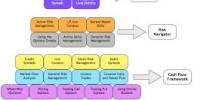A Collateralized Mortgage Obligation (CMO) is a type of mortgage-backed security that is created by pooling individual mortgage loans and then dividing them into different classes of securities, known as tranches. It is a type of complex debt security that repackages and directs principal and interest payments from a collateral pool to various types and maturities of securities, thereby meeting the needs of investors. Each tranche has its own set of cash flow characteristics and risk profile, depending on its priority in receiving principal and interest payments.
In a CMO, the underlying mortgage loans are used as collateral to back the securities. The cash flows from the mortgage loans are distributed to the different tranches in a predefined order, with the senior tranches receiving payments first, followed by the subordinate tranches. This allows investors to choose a specific tranche that matches their investment goals and risk tolerance.
CMOs were invented in 1983 by the investment banks Salomon Brothers and First Boston for the mortgage liquidity provider Freddie Mac in the United States. Lewis Ranieri led the Salomon Brothers team, and Laurence D. Fink led the First Boston team (although Dexter Senft later received an industry award for his contribution). By pooling the mortgages together and creating different tranches of securities, lenders were able to sell off the risk associated with the mortgages, which freed up capital to make more loans.
Investors in CMOs can include banks, insurance companies, pension funds, and individual investors. However, because of their complex structure and varying levels of risk, CMOs are generally considered to be more suitable for sophisticated investors with a high level of financial knowledge.
Collateralized mortgage obligations are made up of several tranches, or groups of mortgages, that are organized according to their risk profiles. Tranches, as complex financial instruments, typically have different principal balances, interest rates, maturity dates, and the possibility of repayment defaults. Collateralized mortgage obligations are sensitive to changes in interest rates as well as changes in economic conditions, such as foreclosure rates, refinance rates, and the rates at which properties are sold. Each tranche has a different maturity date and size, and bonds with monthly coupons are issued against it. The coupon makes monthly principal and interest rate payments.
















